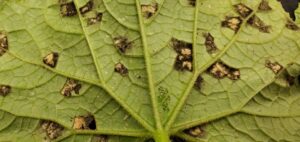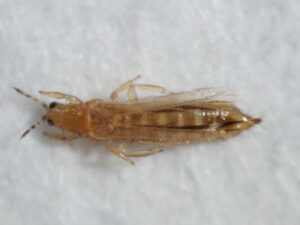Symptoms usually begin to appear on random plants throughout the field as green fruit begins to mature. The bacterium (Pseudomonas corrugata) is ubiquitous to soils and develops when weather conditions (cooler nights/very hot, humid days) and cultural practices (i.e., excess heavy N use) lead to favorable conditions for disease development. Symptoms include the development of irregular greasy (at first), brown lesions on main stems and branches. Late pruning (i.e., suckering) can provide entry points for the bacterial disease. Internally, stems will become chocolate brown and mushy. High humidity is necessary for disease development. High nitrogen and lower night temperatures are associated with Pith Necrosis development, where it has been reported around the state this past week. Control begins with cultural practices such as avoiding working in fields with wet foliage, avoiding late pruning, tying when plants are wet, and watching the amount of N applied to plantings. Infected plants can be rouged from field and most often it does not spread to nearby uninfected plants.
Vegetable Crops Edition
Seasonal updates and alerts on insects, diseases, and weeds impacting vegetable crops. New Jersey Commercial Vegetable Production Recommendations updates between annual publication issues are included.
Subscriptions are available via EMAIL and RSS.
Quick Links:
 NJ Commercial Vegetable Production Recommendations
NJ Commercial Vegetable Production Recommendations
 Rutgers Weather Forecasting - Meteorological Information important to commercial agriculture.
Rutgers Weather Forecasting - Meteorological Information important to commercial agriculture.
Identifying and controlling common leaf spot in strawberry
Strawberry leaf spot, caused by the soil-borne fungal pathogen, Mycosphaerella fragariae, can infect leaves, petioles, runners, fruit stalks (pedicels), and berry caps or calyxes. Small, dark purple to reddish-purple, round spots, 1/8 to 1/4 inch in diameter (3 to 6 millimeters), appear on the upper leaf surfaces. The center of the spots soon become tan or gray and eventually almost white, while the broad margins remain dark purple. Later in the season, dark specks (sclerotia and/or perithecia) may be seen in the older lesions. Tannish areas form on the undersides of infected leaves. The symptoms on the other plant parts, except the fruit, are almost identical to those that develop on the upper leaf surface. [Read more…]
Vegetable Disease Update: 07-08-23
- Cucurbit downy mildew has been reported on cucumber and cantaloupe in southern New Jersey. For more information on CDM control please click here.
- Blackleg has been reported on potato in New Jersey.
- There have been no reports of Late blight in potato or tomato in the region to date. To follow the progress of Late blight in the US please click here.
- Bacterial leaf spot has been reported in pepper. More more information on BLS control please click here. Rutgers is surveying tomato and pepper fields throughout the state this summer to help determine the makeup of the bacterial population and for copper resistance development.
- Powdery mildew has been reported in cucurbit crops. For more information on the control of CPM please click here.
- Southern blight has been reported on pepper.
- Bacterial canker has been reported in tomato. For more information on diagnosing important tomato diseases please click here.
- Phytophthora blight has been reported on pepper. For more information on controlling Phytophthora blight please click here.
- For information on diagnosing important pepper diseases please click here.
- The 2022/2023 Commercial Vegetable Production Recommendations Guide is available for free online or for sale in hardcopy form at many County offices.
- For a quick review on managing fungicide resistance development using tank mixes and fungicide rotations, and information on FRAC group 4, FRAC group 7, and FRAC group 3 and FRAC group 11 fungicides please click on hyperlinks.
Cucurbit Downy Mildew Alert – Cantaloupe – 7/8/23
Cucurbit downy mildew has been confirmed on cantaloupe in Salem County on July 7th and on cucumber in Gloucester County (7/1) and in Atlantic County (6/13) in southern New Jersey. This is the third report of CDM in the state and region this growing season. All cucumber and cantaloupe growers should scout on a daily basis and initiate a preventative fungicide program immediately. All other cucurbit plantings need to be scouted on a regular basis. CDM was last confirmed on cucumber and butternut squash in coastal South Carolina. Remember, some CDM isolates fall into Clade I which predominately infect watermelon, pumpkin, and squash, where CDM isolates in Clade II predominately infect cucumber and cantaloupe.
For more information on CDM, the clades, and CDM control please click here.

Cucurbit downy mildew sporulating on the underside of an infected cucumber leaf.
Identifying and controlling Botrytis in high tunnel and greenhouse tomato production
Botrytis, or gray mold, caused by the fungus, Botrytis cinerea, can cause significant losses in high tunnel and greenhouse tomato production if not controlled properly. The pathogen can rapidly spread during periods when structures are closed and when relative humidity remains high for long periods of time. This often occurs when outside weather remains cool and damp while heating is needed. Gray mold is favored by temperatures from 64° to 75°F and requires only high humidity (not leaf wetness) to become established. The pathogen has a large host range and once established in an enclosed structure it can be very difficult to control (UMASS). The fungus can survive/overwinter as mycelia or sclerotia in plant debris and in organic soil matter (NCSU).
Monitor for Thrips in Vegetable Crops
Now that spring grains like wheat and rye have dried down and are being combined, thrips in those fields will move to vegetable crops, especially when small grains are adjacent to vegetable fields. Thrips are very small and often missed if casually looking at a plant since they hide in blossoms, under sepals, on under sides of leaves and other protected areas on the stems, leaves and flowers. To scout for thrips look at plant parts mentioned above. It is also important to dissect a flower, pulling back petals and sepals to find hiding thrips. It is difficult to see thrips with the naked eye. Therefore, the use of a hand lens will help.
Most adult thrips are elongate, slender, very small (less than 1/20 inch long), and have long fringes on the margins of both pairs of their long, narrow wings. Immature thrips (called larvae or nymphs) are oblong or slender and elongate and lack wings. Most thrips range in color from translucent white or yellowish to dark brown or black. See the photo of an adult thrips below by Dr. David Kerns, Professor, IPM Coordinator and Extension Specialist, Texas A&M AgriLife Extension, College Station.
Thrips hatch from an egg and develop through two actively feeding larval stages and two nonfeeding stages, the prepupa and pupa, before becoming an adult. Late-instar larvae change in appearance and behavior and are called prepupae and pupae, even though thrips do not have a true pupal stage.
Females of most plant-feeding species lay their elongate, cylindrical to kidney-shaped eggs on or into leaves, buds, or other locations where larvae feed. Thrips have several generations (up to about eight) a year. When the weather is warm, the life cycle from egg to adult may be completed in as short a time as 2 weeks.
Thrips will feed on most all vegetable crops – solanaceous crops like eggplant, tomatoes, peppers, white potatoes, cucurbit crops like cucumber, squash and melons, bean crops, allium crops like onions, garlic and leeks and others.
Thrips feeding on plants can damage fruit, leaves, and shoots and very noticeably affect plants’ appearance. Leaves may be speckled on the top surface from feeding on under sides of leaves by the insect’s sucking mouthparts. Damage to fruit, like tomatoes may not appear until fruit ripen and can be seen as gold flecks on red tomato fruit. For many thrips species, by the time their damage is seen, such as after flowers open or fruit forms, the thrips may no longer be present.
Once thrips are identified, control can be difficult when they are found in high numbers. Preventative measures like the use of row covers and reflective mulch have some success. Both conventional and organic insecticides labeled for thrips control can be found in the Rutgers Commercial Vegetable Production Recommendations guide under the sections for individual vegetable crops. Always read the pesticide label for instructions, safety precautions, application rates and restrictions. Since thrips hide in tight areas of plant parts it is important to have good coverage and penetration when applying insecticides to reduce the population of this hard to control pest.
For more detailed information about thrips see the Rutgers Fact Sheet https://njaes.rutgers.edu/pubs/publication.php?pid=FS291
